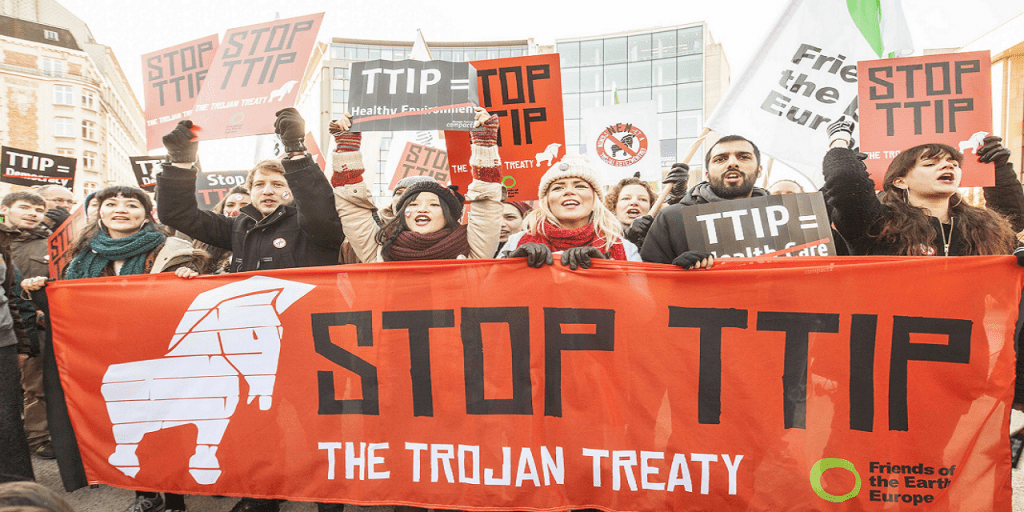A leaked European Union document has revealed that the EU is willing to trade away essential environmental safeguards during the ongoing EU-US trade talks.
The leaked document, which provides an overview of the EU’s opening position on ‘sustainable development’ in the negotiations on the Transatlantic Trade and Investment Partnership (TTIP), is full of unbinding and unenforceable language that shows that the EU is not committed to safeguarding essential environmental policies and protections. It also fails to even mention TTIP’s many threats to the environment, or propose any concrete measures to counter these threats.
Environmental groups in the U.S. and in Europe have expressed their “deep concern” about the EU position in their analysis of the text, warning that nothing in the proposal would prevent foreign corporations from attacking environmental policies in unaccountable trade tribunals or from TTIP expanding trade in dangerous fossil fuels like oil and gas.
The groups have also stated that the document’s weak language contradicts the EU’s previous claims that a forthcoming proposal for a TTIP chapter on “Trade and sustainable development” would aim to “safeguard basic rules that protect… the environment” and “reinforce[e]… environmental governance.”
Natacha Cingotti, trade campaigner at Friends of the Earth Europe, said:
“This new leak illustrates that the European Commission is not serious about protecting essential safeguards for citizens and the environment in the context of the TTIP talks. The negotiations are already being used as a lobby vehicle by powerful corporate polluters who are likely to get VIP treatment above the rest of society, the only chapter that could bring strong language to protect essential regulations to build a sustainable future are weak and unenforceable.”
Environmental groups have already expressed concerns about the negative climate impacts of the EU’s TTIP negotiating objectives, including the decision to prioritise access to US fossil fuels instead of maximizing the potential of renewables and efficiency, despite having set targets to reduce climate emissions by 2020.
Ilana Solomon, director of the Sierra Club’s Responsible Trade Program, said:
“This sustainable development proposal is anything but sustainable. It’s window-dressing, at best. Not only are the supposed environmental safeguards toothless, but the proposal lacks any enforcement mechanism. Nothing in the chapter would change the fact that TTIP would empower corporations like Shell and Chevron to challenge climate and environmental policies in private trade tribunals and lead to increased exports and production of oil and gas. The United States cannot afford to join another trade deal that sets us back on environmental progress and climate action.”
The main points of the proposed chapter can be summarised as follows:
– The leaked text fails to provide any adequate defense for environment-related policies likely to be undermined by TTIP. For example, nothing in the text would prevent foreign corporations from launching challenges against climate or other environmental policies adopted on either side of the Atlantic in unaccountable trade tribunals.
– The environmental provisions are vaguely-worded, creating loopholes that would allow governments to continue environmentally harmful practices. The chapter lacks any obligation to ratify multilateral agreements that would bolster environmental protection and includes a set of vague goals with respect to biological diversity, illegal wildlife trade, and chemicals.
– The leaked text includes several provisions that the European Commission may claim as “safeguards,” such as a recognition of the “right of each Party determine its sustainable development policies and priorities” but none would effectively shield environmental policies from being challenged by rules in TTIP.
– There is no enforcement mechanism for any of the provisions mentioned in the text. Even if one were included, it would still be weaker than the enforcement mechanism provided for foreign investors either through the investor-state dispute settlement mechanism or the renamed investment court system.







